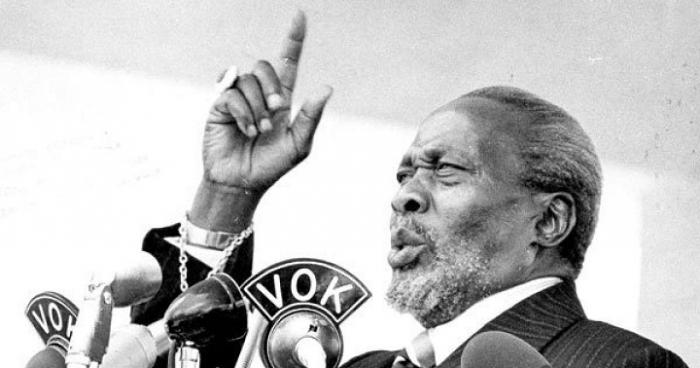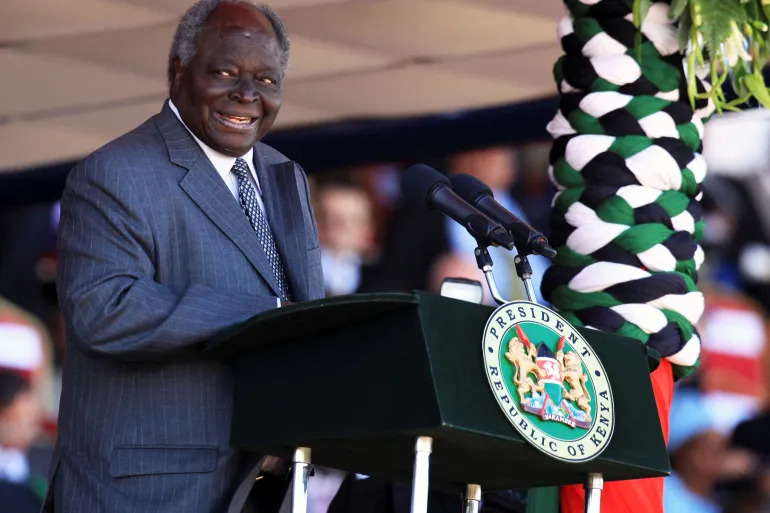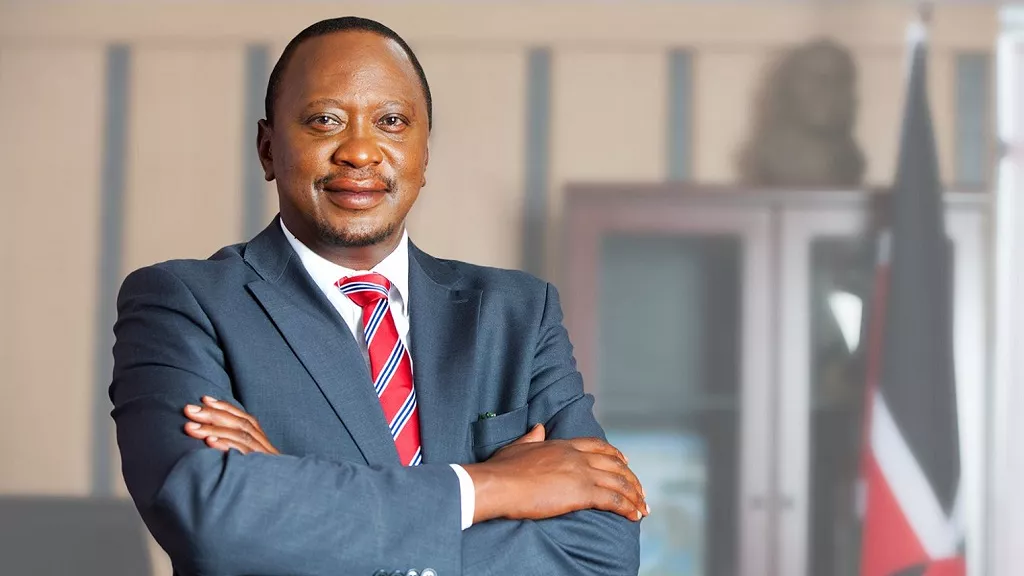From Kenya’s founding fathers to its present leaders, a journey through history and politics.
Jomo Kenyatta
Jomo Kenyatta, whose original name was Kamau wa Ngengi, stands as a pivotal figure in Kenya’s history, revered as the country’s founding father and its first President. Born around 1897 in Gatundu, then part of British East Africa, Kenyatta’s early life was deeply influenced by the transformations brought by British colonial rule.
As a young man, Kenyatta pursued education at mission schools, where he encountered Western ideas alongside traditional Kikuyu customs. His journey eventually led him to London in the 1920s, where he immersed himself in political activism and Pan-African movements. During this period, he became an eloquent advocate for African rights and self-determination, positioning himself as a voice for decolonization and independence.

Kenyatta’s return to Kenya in the 1940s coincided with a surge in nationalist sentiment and the emergence of the Kenya African Union (KAU), a political organization he would come to lead. His leadership and vision played a crucial role in shaping Kenya’s path to independence. Despite facing incarceration by British authorities for alleged involvement in the Mau Mau rebellion, Kenyatta’s stature continued to grow among Kenyans seeking freedom from colonial rule.
In 1963, Kenya achieved independence, with Jomo Kenyatta assuming office as its Prime Minister and later becoming the country’s first President in 1964. His presidency spanned nearly fifteen years, marked by efforts to consolidate national unity, economic development, and the promotion of Kenya’s identity on the global stage.
Political Career and Contributions
- Early Political Activism: Kenyatta emerged in the 1940s as a central figure in Kenya’s nationalist movement against British colonial rule. He founded the Kenya African Union (KAU), advocating fiercely for African rights and self-governance.
- Advocacy for Land and Political Rights: Kenyatta’s early political activities focused on addressing the grievances of Kenya’s African population, particularly issues related to land ownership and political representation. He sought to empower Africans amidst colonial restrictions.
- Mau Mau Movement and Imprisonment: Kenyatta’s association with the Mau Mau movement, aimed at reclaiming land and resisting colonial oppression, led to his arrest in 1952. Despite nearly a decade of imprisonment, he continued to influence Kenyan independence through writings and advocacy.
- Path to Independence: Upon release in 1961, Kenyatta negotiated with British authorities, culminating in Kenya’s independence on December 12, 1963. He served as Prime Minister and then President, overseeing Kenya’s transition to self-governance.
- Nation-Building and Unity: Kenyatta promoted national unity among Kenya’s diverse ethnic groups, advocating the concept of Harambee (“pulling together”) for collective national development.
- Economic Development: His administration focused on economic growth, infrastructure development, education expansion, and agricultural reforms aimed at improving productivity and livelihoods.
- Foreign Policy: Kenyatta positioned Kenya as a leading voice in Pan-Africanism and Non-Aligned Movement politics, shaping Africa’s post-colonial identity and advocating for unity and solidarity.
Legacy and Influence
Jomo Kenyatta remains a revered figure in Kenya’s cultural and historical narrative, celebrated through monuments, institutions, and national holidays that commemorate his contributions to Kenya’s independence and development. His political journey from activist to statesman was marked by dedication to Kenya’s sovereignty and prosperity, leaving a lasting impact on the nation’s ongoing efforts to build a resilient and inclusive society.
Daniel arap Moi
Daniel arap Moi, one of Kenya’s longest-serving presidents, played a significant role in shaping the country’s political landscape during his tenure from 1978 to 2002. Here’s an overview of his life, political career, and contributions:

Early Life and Rise to Power
Daniel Toroitich arap Moi was born on September 2, 1924, in Kurieng’wo village, Baringo District, in the Rift Valley region of Kenya. His early education was at Kapsabet African Mission School and later at Tambach Teachers Training College. Moi started his career as a teacher before venturing into politics.
Political Career
- Entry into Politics: Moi’s political career began in the 1950s, where he joined the Kenya African Democratic Union (KADU), advocating for a decentralized government in contrast to the centralist policies of the Kenya African National Union (KANU), led by Jomo Kenyatta.
- Vice Presidency: Moi became Kenya’s Vice President in 1967 under President Jomo Kenyatta’s government, a position he held until Kenyatta’s death in 1978.
Presidency (1978-2002)
- Assumption of Presidency: Following Kenyatta’s death, Moi succeeded him as Kenya’s second President on October 14, 1978. He was officially elected President in 1979 and subsequently re-elected in 1983, 1988, 1992, and 1997.
- Domestic Policies: Moi’s presidency was characterized by a mix of authoritarian rule and attempts at economic development and social stability. His government promoted Nyayoism, a philosophy emphasizing peace, love, and unity, while also facing criticism for human rights abuses and political repression.
- Economic Policies: Moi’s economic policies included efforts to promote rural development, expand infrastructure, and support agriculture. However, his tenure also saw economic challenges, including corruption and mismanagement.
- Political Stability and Challenges: Moi’s leadership navigated various challenges, including ethnic tensions, opposition movements, and demands for multi-party democracy. He initially resisted calls for political pluralism but eventually yielded to pressure, leading to the reintroduction of multi-party politics in 1991.
Legacy and Controversies
- Legacy: Daniel arap Moi’s legacy in Kenya is mixed. He is credited with maintaining political stability during a tumultuous period in East Africa, promoting educational access, and fostering a sense of national identity through Nyayoism. His tenure also saw significant infrastructure development, including roads, schools, and hospitals.
- Criticism and Controversies: Moi’s presidency was marred by allegations of corruption, human rights abuses, and political repression, particularly against opposition figures and dissidents. Critics argue that his authoritarian policies stifled democratic freedoms and hindered Kenya’s progress in governance and human rights.
Later Years and Death
- Retirement: After stepping down from the presidency in 2002 following two terms, Moi remained active in Kenyan politics and public life but largely retired from the spotlight. He passed away on February 4, 2020, leaving behind a complex legacy that continues to be debated in Kenya and beyond.
Daniel arap Moi’s impact on Kenya’s history is profound, reflecting both his efforts to steer the nation through challenges and criticisms of his leadership style and policies. His presidency marked a pivotal era in Kenya’s political evolution, influencing the country’s trajectory in governance, economic development, and human rights.
Mwai Kibaki
Mwai Kibaki, a prominent figure in Kenya’s political history, served as the country’s third President from 2002 to 2013. Here’s an in-depth look at his life, political career, and contributions:

Early Life and Education
Mwai Kibaki was born on November 15, 1931, in Gatuyaini village, Nyeri District, in Kenya’s Central Province. He received his early education at Gatuyaini Primary School and Mang’u High School before pursuing further studies at Makerere University College (now Makerere University) in Uganda and the London School of Economics in the United Kingdom.
Political Career
- Entry into Politics: Kibaki’s political career began in the 1960s when he joined the Kenya African National Union (KANU), the dominant political party led by President Jomo Kenyatta. He held various ministerial positions in Kenyatta’s and later President Daniel arap Moi’s governments, including Finance Minister, Health Minister, and Vice President.
- Opposition Leadership: In 1991, Kibaki formed the Democratic Party (DP) after falling out with Moi’s KANU over issues of governance, democracy, and economic policy. He became a leading opposition figure advocating for multi-party democracy and reforms.
Presidency (2002-2013)
- Election: Mwai Kibaki won the 2002 presidential election, marking a significant shift in Kenyan politics as he succeeded Daniel arap Moi. His victory ended over two decades of single-party rule under KANU and ushered in a new era of multi-party democracy and reform.
- Government Reforms: During his presidency, Kibaki implemented various reforms aimed at promoting transparency, accountability, and economic growth. His administration focused on infrastructure development, education expansion, healthcare improvements, and agricultural modernization.
- Economic Policies: Kibaki’s economic policies included efforts to attract foreign investment, reduce poverty through job creation and social programs, and stabilize the economy. Kenya experienced notable economic growth during his tenure, bolstered by reforms and infrastructure projects.
- Constitutional Reforms: One of Kibaki’s significant achievements was the promulgation of a new constitution in 2010, which aimed to decentralize power, strengthen institutions, and enhance the protection of human rights and freedoms.
Legacy and Contributions
- Infrastructure Development: Kibaki’s presidency saw extensive infrastructure projects, including roads, bridges, and energy initiatives, aimed at modernizing Kenya’s infrastructure network and supporting economic development.
- Education and Healthcare: His administration prioritized investments in education and healthcare, expanding access to schools and healthcare facilities across the country, particularly in rural areas.
- Democratic Legacy: Mwai Kibaki is remembered for his role in advancing Kenya’s democratic governance, fostering a more pluralistic political environment, and laying the groundwork for subsequent electoral reforms.
- Post-Presidency: After leaving office in 2013, Kibaki retired from active politics but remained influential in national affairs and continued to advocate for national unity, development, and good governance until his passing in April 2022.
Mwai Kibaki’s presidency marked a transformative period in Kenya’s history, characterized by economic growth, institutional reforms, and a commitment to democratic principles. His leadership legacy continues to resonate in Kenya’s ongoing quest for development, governance improvement, and national prosperity.
Uhuru Kenyatta

Early Life and Education
Uhuru Kenyatta was born into a prominent political family on October 26, 1961, in Nairobi, Kenya. His father, Jomo Kenyatta, was Kenya’s first President, and his upbringing provided him with a deep understanding of Kenya’s political landscape from an early age. He attended St. Mary’s School in Nairobi for his primary education before pursuing higher studies abroad.
Kenyatta later studied economics and political science at Amherst College in Massachusetts, USA. His education abroad exposed him to global perspectives on governance and economics, which would later influence his approach to leadership.
Political Career
- Entry into Politics: Uhuru Kenyatta entered Kenya’s political scene during a transformative period in the early 1990s when multi-party politics were reintroduced. He joined the Kenya African National Union (KANU), the party that his father had led during Kenya’s early years of independence.
- Rise within KANU: Kenyatta quickly ascended within KANU’s ranks, eventually becoming the party’s Chairman. His leadership within the party positioned him as a key figure in Kenyan politics, known for his ability to navigate political alliances and challenges.
- Government Roles: During President Daniel arap Moi’s administration, Kenyatta served in several ministerial positions, including Deputy Prime Minister and Minister of Finance. His tenure in these roles allowed him to influence economic policies and strategies aimed at fostering growth and stability.
Presidency (2013-2022)
- Election and Inauguration: Uhuru Kenyatta was elected as Kenya’s fourth President in March 2013, succeeding Mwai Kibaki. His victory marked the return of the Kenyatta family to the presidency after nearly a decade, ushering in expectations of continuity and change.
- Big Four Agenda: Kenyatta’s presidency has been characterized by the implementation of the Big Four Agenda, a strategic framework focusing on four key pillars: affordable housing, universal healthcare, manufacturing, and food security. These initiatives aim to address critical socio-economic challenges facing Kenya, with efforts to stimulate job creation, improve healthcare access, and enhance food production.
- Infrastructure Development: President Kenyatta has overseen ambitious infrastructure projects, including the construction of the Standard Gauge Railway (SGR), expansion of major highways, and modernization of ports and airports. These initiatives are crucial for enhancing regional connectivity and supporting economic growth across Kenya.
- Foreign Relations: Under Kenyatta’s leadership, Kenya has maintained a proactive foreign policy aimed at strengthening diplomatic ties, promoting trade relations, and advancing regional integration within East Africa and across the African continent. His administration has emphasized Kenya’s role as a regional hub for commerce, innovation, and cultural exchange.
Legacy and Challenges
- Economic Growth and Challenges: Kenya has experienced consistent economic growth under Kenyatta’s presidency, although challenges such as corruption, unemployment, and income inequality remain significant concerns. Efforts to address these issues are ongoing, with reforms aimed at improving governance, transparency, and accountability.
- Social Programs and Welfare: Kenyatta’s government has implemented various social welfare programs aimed at enhancing education, healthcare, and social security for vulnerable populations. Initiatives like the National Health Insurance Fund (NHIF) expansion and Free Primary Education have aimed to improve access to essential services for all Kenyans.
- Continued Leadership and Influence: Uhuru Kenyatta continues to play a pivotal role in Kenya’s political landscape, shaping policies and initiatives aimed at advancing national development goals while navigating the complexities of coalition politics and governance.
Uhuru Kenyatta’s presidency reflects a commitment to steering Kenya towards socio-economic prosperity and regional leadership.
William Ruto
William Ruto (born December 21, 1966, in Sambut, Kenya) is a prominent Kenyan businessman and politician who currently serves as the President of Kenya, assuming office in 2022.

Personal Life and Education
William Ruto was born to Daniel and Sarah Cheruiyot in Sambut village, which is now part of Uasin Gishu county. Raised in a religious family with ties to the African Inland Church, Ruto attended Kerotet Primary School and Wareng Secondary School before continuing his education at Kapsabet High School. He later pursued higher education at the University of Nairobi, where he earned a B.S. in botany and zoology in 1990. Returning to the same institution, Ruto furthered his studies, obtaining an M.S. in 2011 and a Ph.D. in plant ecology in 2018. In 1991, he married Rachel Chebet, with whom he has six children, and he also has a daughter with Prisca Chemutai Bett.
Ruto has often spoken about his humble beginnings, recalling years spent barefoot and selling peanuts and chickens to support himself financially. Through various business ventures in real estate, agriculture, hospitality, and insurance, he amassed significant wealth as an adult.
Entry into Politics
Ruto’s political career began in 1992 when he co-founded the Youth for KANU 1992 group in support of Daniel arap Moi’s presidential candidacy under the Kenya African National Union (KANU). He was first elected to parliament in 1997 and re-elected in 2002. During this time, he briefly served as Minister of Home Affairs under President Moi’s administration. Amidst internal party divisions over Moi’s successor, Ruto remained loyal to KANU and supported Uhuru Kenyatta’s bid for the presidency in 2002, despite the party’s split.
In 2005, Ruto became the Secretary-General of KANU and played a pivotal role in opposing a proposed new constitution in a 2005 referendum. His stance against the constitution aligned him with other political leaders, leading to successful campaign efforts against its adoption. Subsequently, Ruto expressed presidential ambitions and sought the Orange Democratic Movement (ODM) nomination in 2007 but later resigned from KANU.
Disputed 2007 Elections, Coalition Government, and ICC Trial
In the controversial December 2007 elections, Ruto supported Raila Odinga’s presidential bid under the ODM coalition, challenging the results that declared Mwai Kibaki the winner. The dispute led to widespread violence across ethnic lines, resulting in over 1,000 deaths and displacing hundreds of thousands. International mediation efforts culminated in a coalition government in 2008, with Ruto appointed as Minister of Agriculture and later Minister of Higher Education.
Ruto’s political career faced a significant challenge when he was charged by the International Criminal Court (ICC) in 2011 for crimes against humanity related to the post-election violence. The case against him was terminated in 2016 due to insufficient evidence, though the ICC noted interference with witnesses and political meddling.
UhuRuto Alliance and Presidency
In the 2013 elections, Ruto teamed up with Uhuru Kenyatta to form the Jubilee Coalition, known as “UhuRuto,” with Kenyatta running for president and Ruto for deputy president. They won the election and were re-elected in 2017 after a nullification and subsequent re-run, solidifying their leadership under the Jubilee Party.
2022 Elections and Presidency
Ahead of the 2022 elections, Ruto formed the United Democratic Alliance and contested the presidency against Raila Odinga. He campaigned on a platform appealing to the “hustler” narrative, contrasting his background with that of Kenya’s political dynasties. After a contentious election process, Ruto was declared the winner with over 50% of the vote. His victory was upheld by the Supreme Court despite challenges, and he was inaugurated as Kenya’s President on September 13, 2022.
William Ruto’s presidency marks a significant chapter in Kenya’s political landscape, characterized by his journey from grassroots activism to the highest office in the land. His leadership faces ongoing challenges and scrutiny, yet his political trajectory continues to shape Kenya’s socio-economic and political future.




